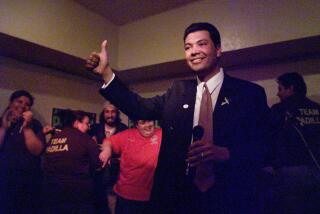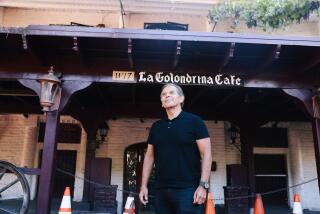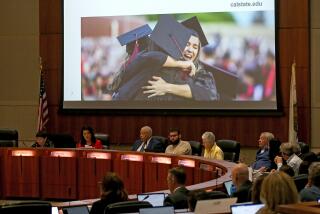Board Shake-Up Resolves Conflict Over Health Clinic : Pacoima: The removal of several longtime directors clears the way for a $3.5-million federal grant.
A conflict between the federal government and a health clinic for the poor in the San Fernando Valley has been resolved with the removal of several longtime members of the clinic board of directors.
“We have received verbal assurances from the federal government that they are satisfied and we are in good standing,” said Bob Smith, executive director of the Northeast Valley Health Corp. in Pacoima.
Federal sources privately confirmed that problems over spending and the makeup of the board have been resolved. Failure to clear up the problems threatened a portion of its $3.5-million federal grant, potentially forcing a cut in patient services.
Northeast Valley is a nonprofit corporation that operates clinics in Pacoima and San Fernando on an $8-million annual budget derived from state, federal and county agencies.
The federal Department of Health and Human Services had criticized Northeast Valley for having a governing board that did not reflect the racial makeup of the community it served. Power was shared by several ethnic constituencies, with blacks holding six seats and Latinos six seats.
The government also criticized the board for not placing a limit on the length of board members’ terms. At least four members had been on the board for 19 years, dating to the founding of the organization in 1972. Critics said this longevity led the board to regard itself as a private club that could travel where its members wanted and use taxpayer funds as they saw fit.
Finally, the government said the agency had allocated a “totally unreasonable” amount of money for board travel. The old board had budgeted $40,000 for travel this year alone.
Smith said the last of the longtime board members left in July. As of Aug. 1, a 12-member board was in place, with seven of the new members on the board less than a year. Two-thirds of the board is Latino, reflecting the mostly Latino community served by the clinics. Three more members are expected to be appointed.
The final budget for the new governing board is 60% lower than proposed. Less than half as much money as initially budgeted is set aside for travel.
Smith said he is happy to put the problems behind him. While the federal criticism never extended to patient care, Smith said the issue had been distracting.
“I’m very excited about the new board,” he said. “We are looking for some very positive things.”
While the old board had a reputation for squabbling, Smith said the new organization is already finding an identity and has “very quietly made some significant changes” in the way it conducts business and its readiness to take on new challenges.
The new board president is Joaquin Comaduran, a businessman who has been on the board eight years. Other members include a physician, two attorneys and two students. The students were selected to satisfy requirements that a significant portion of the board should be made up of people who use the clinic services themselves.
Smith said the organization will now turn its attention to increasing medical services to the poor, the numbers of whom are growing as the recession continues. He said he hopes to expand the number of sites where care is provided, though no locations have been chosen yet.
The organization also is preparing to participate in National Immunization Day on Sept. 28. The event is designed to encourage parents to immunize their children against a variety of childhood diseases.
More to Read
Sign up for Essential California
The most important California stories and recommendations in your inbox every morning.
You may occasionally receive promotional content from the Los Angeles Times.










